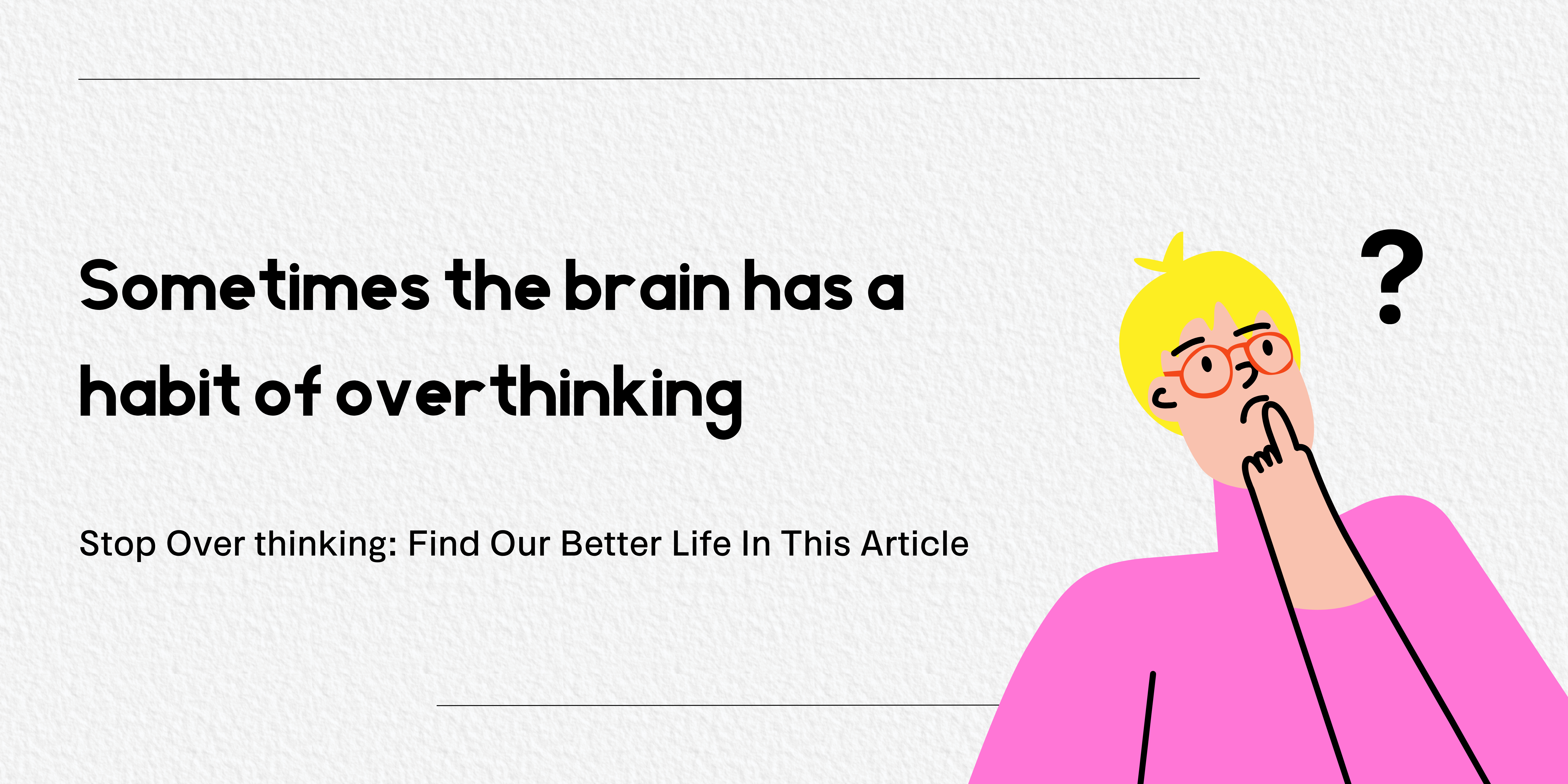Stop Overthinking: Effective Ways to Cope and Find Peace of Mind

What Causes Overthinking?
Sometimes the brain has a habit of overthinking, which can stem from various mental health conditions like generalized anxiety disorder. When people tend to overthink, they often obsess over negative thoughts and ruminate on the worst-case scenario. This thought pattern of constantly dwelling and replaying situations leads to second-guessing every possible outcome.
Overthinking everything can disrupt daily life and create a habit of catastrophizing. When you can’t stop worrying and overthinking things, it often leads to stress and anxiety. The next time you find you’re overthinking, consider practicing mindfulness or jotting down your thoughts to help you manage.
#1. Fear of Failure or Mistakes:
Worrying about making the wrong decision or failing can lead to overthinking. This often stems from perfectionism or a lack of confidence in one’s abilities.
#2. Uncertainty about the Future:
When faced with uncertain situations, people tend to overanalyze possibilities in an attempt to predict outcomes or control the future.
#3. High-Stress Levels:
Stress from personal, professional, or social situations can trigger overthinking as the mind tries to find solutions or make sense of complex problems.
#4. Lack of Control:
Feeling powerless or having little control over situations can cause people to overthink, as they dwell on what could go wrong or what they could do differently.
#5. Negative Self-Talk:
A habit of criticizing oneself or focusing on negative thoughts can lead to overthinking, as the mind replays past events or worries excessively about the future.
There are actionable steps you can take to break the habit of overthinking. Psychotherapy can be beneficial for overthinkers. Practicing mindfulness techniques and focusing on the present can also help reduce the tendency to overthink and improve overall mental health.
How Anxiety Disorders Contribute to Overthinking

Overthinking can stem from various mental health conditions like generalized anxiety disorder, where individuals tend to overthink everything and ruminate on negative thoughts. This thought pattern often leads to dwelling on the worst-case scenario and catastrophizing possible outcomes, causing significant mental distress.
Anxiety disorders can significantly contribute to overthinking in the following ways:
#1. Catastrophic Thinking:
People with anxiety disorders often have a tendency to expect the worst-case scenarios. This type of thinking can cause them to overanalyze situations, leading to endless loops of worry and rumination.
#2. Excessive Worrying About Everyday Situations:
Anxiety can cause individuals to worry excessively about minor or everyday situations, leading them to repeatedly think about every possible outcome or consequence, even when the likelihood of negative results is low.
#3. Hypervigilance:
Those with anxiety disorders often experience heightened alertness to potential threats or dangers. This state of constant vigilance can cause them to overthink and analyze every detail of a situation, perceiving threats where there may be none.
4. Need for Reassurance:
Anxiety can create a need for continuous reassurance and validation, causing people to overthink their interactions, decisions, and experiences to seek confirmation that they are doing things “right” or that others do not view them negatively.
#5. Avoidance of Uncertainty:
Individuals with anxiety often find uncertainty intolerable, leading them to overthink situations to gain a sense of control. They may ruminate over various scenarios in an attempt to prepare for or avoid uncertain outcomes.
When you’re overthinking, you might replay events repeatedly, second-guess your decisions, and obsess over every possible outcome. This habit of overthinking can disrupt your daily life and relationships. Overthinkers often find themselves stuck in a loop, where they constantly overthink and can’t stop worrying.
To manage overthinking, consider practicing mindfulness and jotting down your thoughts to disrupt the rumination process. Psychotherapy can also offer actionable steps to break free from these patterns. The next time you find yourself overthinking things, remember there are steps you can take to help you manage and improve your mental well-being.
Why Do We Overthink Everything?
Overthinking leads to excessive worrying and can take a toll on mental health, often manifesting as depression or anxiety. People who are constantly overthinking may overanalyze stressful events and rehash past mistakes, which can exacerbate anxiety and depression.
According to Nolen-Hoeksema, overthinking takes up mental energy and can lead to excessive worrying, making it difficult to focus on solving a problem. For 35-year-olds, this process can help them understand thoughts and feelings, but excessive rumination may become a coping mechanism.
Mindfulness can help in breaking the cycle of overthinking, and it can go a long way in managing anxiety and depression. By focusing on the present, mindfulness can help you work through things that bother you without falling into the trap of constantly overthinking.
However, if overthinking happen frequently, it may be a symptom of depression or other mental health issues like substance use disorders. Understanding why we overthink and seeking appropriate help can significantly improve quality of life.
How Can You Stop Overthinking?
#1. Ways to Stop Overthinking
Anxiety can lead to overthinking, which can increase your risk of stress and mental exhaustion. To quiet your mind, consider taking a walk around the block to shift your focus and relax. Scheduling a time to address worries can also help you feel more in control.
Here are ten effective ways to help stop overthinking:
#2. Practice Mindfulness and Meditation:
Focus on the present moment through mindfulness exercises or meditation. This helps shift attention away from past regrets or future worries.
#3. Set a Time Limit for Decisions:
Give yourself a specific time frame to make decisions. This can prevent you from overanalyzing every detail and encourage quicker decision-making.
#4. Engage in Physical Activity:
Exercise releases endorphins, which can help reduce stress and distract your mind from overthinking. Even a short walk or stretching can help.
#5. Challenge Negative Thoughts:
Recognize when you are overthinking and consciously challenge your thoughts. Ask yourself if they are realistic or helpful, and reframe them in a more positive or rational light.
#6. Limit Your Information Intake:
Avoid information overload by setting boundaries on the amount of news, social media, or other sources of information you consume. Too much information can fuel overthinking.
7. Focus on Problem-Solving:
Instead of dwelling on what-ifs, identify specific problems you can solve. Break down the issue into manageable steps and take action.
#8. Practice Gratitude:
Shift your focus by writing down things you are grateful for. Gratitude practices can help counter negative thinking and reduce overthinking.
#9. Use Relaxation Techniques:
Techniques like deep breathing, progressive muscle relaxation, or visualization can help calm the mind and reduce overactive thinking.
#10. Keep a Journal:
Write down your thoughts and feelings. Journaling can help you gain clarity, identify patterns, and release pent-up emotions, making it easier to stop overthinking.
#11. Seek Professional Help:
If overthinking is severe and affecting your daily life, consider talking to a therapist or counselor who can help you develop coping strategies.
Engage in tailored strategies like developing coping skills with a professional; a therapist can help you replace the thought patterns that lead to overthinking. Start small by diverting energy into creative activities to manage stress better. Talking to a friend or family member can also be reassuring.
When faced with every decision, understand that not all content is accurate, especially online. Ensure you understand the privacy policy of any products or services you use to avoid unnecessary stress. Trying to gain control over your thoughts with these coping strategies can provide the energy you need to thrive.
Can Mindfulness Help Calm Your Mind?
Benefits of Mindfulness for Overthinking
Mindfulness offers significant benefits for those who overthink. It helps anchor the mind in the present moment, reducing the tendency to dwell on past events or future anxieties.
Practicing mindfulness cultivates greater self-awareness, enabling individuals to recognize and break free from repetitive thought patterns.
This leads to improved mental clarity and emotional balance, fostering a more peaceful and focused state of mind.
Mindfulness Techniques to Try
Practicing mindfulness can greatly enhance your mental well-being. Techniques like deep breathing, body scanning, and guided meditation help center your thoughts and reduce stress. Simply taking a few moments each day to focus on the present can make a significant difference in your overall outlook.
Staying in the Present Moment
Staying in the present moment enhances mindfulness and reduces stress. By focusing on the here and now, we can fully appreciate life’s experiences. This practice encourages a deeper connection with our surroundings and promotes mental clarity and emotional well-being.
What Role Does Meditation Play in Managing Overthinking?
How Meditation Helps You Cope
Meditation helps you cope by promoting relaxation and reducing stress. It enhances mental clarity and emotional stability, allowing you to handle challenges more effectively. Regular practice can improve focus and resilience, making it easier to navigate life’s ups and downs with a calm and balanced mind.
Beginner Meditation Practices
Beginner meditation practices often focus on breathing exercises and mindfulness, helping individuals calm their minds.
Techniques such as guided meditation and body scans are commonly used.
These methods support relaxation and enhance overall well-being.
Integrating Meditation into Your Daily Routine
Integrating meditation into your daily routine can significantly enhance your well-being. Start by dedicating a few minutes each morning to practice mindfulness. Gradually, extend this time as you become more comfortable. Consistency is key, so make it a non-negotiable part of your schedule.
When Should You Seek Professional Help?
Signs You Need to Talk to a Mental Health Professional
Recognizing the signs you need to talk to a mental health professional is crucial. If you experience persistent sadness or anxiety, drastic changes in sleep or appetite, or have thoughts of self-harm, it’s time to seek help. Other indicators include withdrawal from social interactions and overwhelming stress.
Types of Treatment Plans for Overthinking
#1. Cognitive Behavioral Therapy (CBT) helps reframe negative thoughts.
#2. Mindfulness practices like meditation promote present-moment awareness.
#3. Medication such as anti-anxiety drugs may be prescribed for severe cases.
#4. Lifestyle changes including regular exercise and healthy sleep habits support mental well-being.
Finding the Right Counselor for You
#1. Finding the right counselor for you involves assessing their credentials and areas of expertise.
#2. Consider their communication style and whether it aligns with your preferences.
#3. It’s also important to ensure they have experience with issues similar to yours.
#4. Personal comfort and trust are crucial for a successful therapeutic relationship.
Why Hire Task Virtual to Get a Remote Assistant And Find Mental Peace
Besides, there are other advantages to this company. They are…
#1. Payment starts from $6.24 per hour.
#2. Every remote assistant comes with a minimum 5 years of experience and they can manage your work well while you can take a rest or focus on other things.
#3. Also, there is a free trial of 3 hours that you can try






